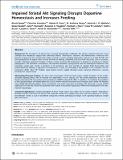Impaired Striatal Akt Signaling Disrupts Dopamine Homeostasis and Increases Feeding
Author(s)
Speed, Nicole; Saunders, Christine; Davis, Adeola R.; Owens, W. Anthony; Matthies, Heinrich J. G.; Saadat, Sanaz; Kennedy, Jack P.; Vaughan, Roxanne A.; Neve, Rachael L.; Lindsley, Craig W.; Russo, Scott J.; Daws, Lynette C.; Niswender, Kevin D.; Galli, Aurelio; ... Show more Show less
DownloadNeve-2011-Impaired Striatal Akt Signaling Disrupts Dopamine Homeostasis and Increases Feeding.pdf (460.0Kb)
PUBLISHER_CC
Publisher with Creative Commons License
Creative Commons Attribution
Terms of use
Metadata
Show full item recordAbstract
The prevalence of obesity has increased dramatically worldwide. The obesity epidemic begs for novel concepts and therapeutic targets that cohesively address “food-abuse” disorders. We demonstrate a molecular link between impairment of a central kinase (Akt) involved in insulin signaling induced by exposure to a high-fat (HF) diet and dysregulation of higher order circuitry involved in feeding. Dopamine (DA) rich brain structures, such as striatum, provide motivation stimuli for feeding. In these central circuitries, DA dysfunction is posited to contribute to obesity pathogenesis. We identified a mechanistic link between metabolic dysregulation and the maladaptive behaviors that potentiate weight gain. Insulin, a hormone in the periphery, also acts centrally to regulate both homeostatic and reward-based HF feeding. It regulates DA homeostasis, in part, by controlling a key element in DA clearance, the DA transporter (DAT). Upon HF feeding, nigro-striatal neurons rapidly develop insulin signaling deficiencies, causing increased HF calorie intake.
Methodology/Principal Findings
We show that consumption of fat-rich food impairs striatal activation of the insulin-activated signaling kinase, Akt. HF-induced Akt impairment, in turn, reduces DAT cell surface expression and function, thereby decreasing DA homeostasis and amphetamine (AMPH)-induced DA efflux. In addition, HF-mediated dysregulation of Akt signaling impairs DA-related behaviors such as (AMPH)-induced locomotion and increased caloric intake. We restored nigro-striatal Akt phosphorylation using recombinant viral vector expression technology. We observed a rescue of DAT expression in HF fed rats, which was associated with a return of locomotor responses to AMPH and normalization of HF diet-induced hyperphagia.
Conclusions/Significance
Acquired disruption of brain insulin action may confer risk for and/or underlie “food-abuse” disorders and the recalcitrance of obesity. This molecular model, thus, explains how even short-term exposure to “the fast food lifestyle” creates a cycle of disordered eating that cements pathological changes in DA signaling leading to weight gain and obesity.
Description
DOI is broken and has been reported
Date issued
2011-09Department
Massachusetts Institute of Technology. Department of Brain and Cognitive SciencesJournal
PLoS ONE
Publisher
Public Library of Science
Citation
Speed, N, Saunders, C, Davis, AR, Owens, WA, Matthies, HJG, et al. (2011) Impaired Striatal Akt Signaling Disrupts Dopamine Homeostasis and Increases Feeding. PLoS ONE 6(9): e25169.
Version: Final published version
ISSN
1932-6203